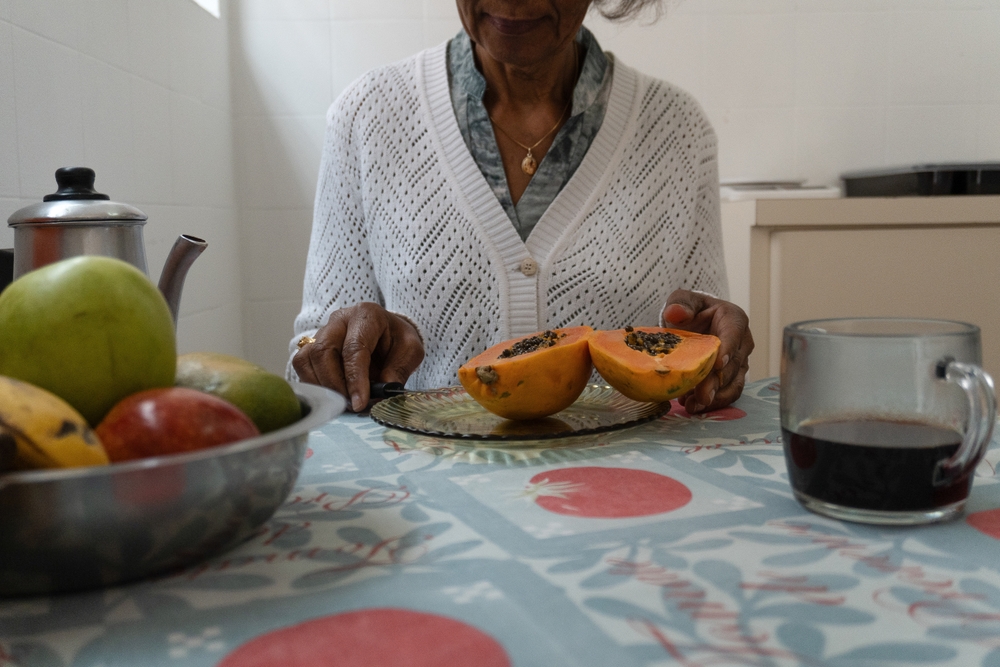Papaya is a rich source of essential nutrients that contribute to overall health. One of the most notable aspects of this tropical fruit is its high vitamin C content, which offers more than 100% of the daily recommended value in just one cup. This vitamin plays a significant role in supporting the immune system, promoting healthy skin, and acting as a powerful antioxidant. Papaya is also rich in beta-carotene, offering higher bioavailability than carrots, making it an excellent choice for improving vision and skin health.
In addition to these vitamins, papaya contains potassium, which supports heart health by helping to regulate blood pressure. Folate, another key nutrient found in papaya, plays an essential role in cell repair and production, making it vital for pregnant women and those recovering from illnesses.
Papaya’s unique enzymes, particularly papain, have been shown to greatly enhance digestion. Papain helps break down proteins, improving nutrient absorption and reducing the chances of bloating or indigestion. Studies indicate that regular consumption of papaya can contribute to a healthier digestive system, as its enzymes also have anti-inflammatory properties that can soothe irritation in the gut.
Incorporating papaya into your diet can also support healthy gut bacteria, helping to maintain a balanced microbiome that is crucial for overall digestive health.
Antioxidant powerhouse effects
The tropical fruit is also known for its impressive antioxidant capacity. Papaya is rich in lycopene, a powerful antioxidant that may help protect against chronic diseases, including certain types of cancer. Combined with beta-cryptoxanthin and vitamin C, papaya’s antioxidants work together to reduce oxidative stress and fight free radicals in the body.
These antioxidants not only contribute to anti-aging effects but also promote healthier, glowing skin by preventing cell damage and boosting collagen production. The combination of these compounds has a protective effect on the body, keeping it in a more youthful and energetic state.
One of the primary benefits of papaya is its ability to promote heart health. Research suggests that the fruit’s high levels of antioxidants, including flavonoids, reduce oxidative stress, which is a significant factor in heart disease. Furthermore, papaya has been shown to improve lipid profiles by reducing unhealthy cholesterol levels and increasing healthy ones.
Additionally, papaya’s anti-inflammatory effects help lower inflammation markers in the blood, which is important for cardiovascular health. Regular consumption of papaya can help support better circulation, reduced blood pressure, and an overall lower risk of heart disease.
Immune system support
The immune-boosting properties of papaya make it an excellent fruit to incorporate into your diet. Its high vitamin C content helps stimulate white blood cell activity, which is essential for fighting off infections. Papaya also increases antibody production, improving the body’s ability to respond to viruses and bacteria.
Moreover, the antioxidants found in papaya work synergistically to reduce oxidative damage and enhance the body’s inflammatory response, helping to keep the immune system strong and efficient.
Emerging studies suggest that papaya may possess cancer-fighting properties, thanks in part to its unique combination of enzymes and antioxidants. Papaya’s ability to prevent DNA damage and support cellular repair may help reduce the risk of cancer by preventing the development of abnormal cells.
Research has shown that papaya may also aid in inhibiting tumor growth by promoting cell death in cancerous cells, without harming healthy cells. By supporting the immune system and reducing inflammation, papaya plays an important role in reducing cancer risk.
Skin and beauty benefits
In addition to its internal health benefits, papaya is an excellent fruit for skin health. It helps to produce collagen, which is vital for maintaining skin elasticity and preventing wrinkles. Papaya’s ability to support wound healing also contributes to a faster recovery from cuts or bruises.
Furthermore, papaya’s anti-aging properties help reduce fine lines and wrinkles, while its rich vitamin A content aids in the regeneration of skin cells, leading to smoother and more radiant skin.
Selection and storage
To fully benefit from papaya’s health-boosting properties, proper selection and storage are essential. Look for papayas that are firm yet yield slightly to gentle pressure, indicating they are ripe and ready to eat. The color of the skin should be a bright yellow-orange when ripe, while the flesh inside should be a rich orange color.
When storing papayas, it’s best to keep them at room temperature until ripe. Once ripe, you can refrigerate them to prolong their freshness. It’s also important to handle the fruit carefully to avoid bruising.
There are many ways to incorporate papaya into your diet. For the freshest taste, enjoy it raw by cutting it into cubes or slices. Papaya can also be blended into smoothies, used in fruit salads, or added to desserts. For those seeking convenience, dried papaya is a great option for snacking or adding to baked goods.
You can even use papaya as a natural meat tenderizer, as its enzymes break down proteins, making it an excellent addition to marinades.
Safety considerations
While papaya offers many health benefits, it is essential to consume it in moderation. Pregnant women should avoid consuming unripe papaya, as it contains latex, which may cause uterine contractions. It’s also important to be aware of any allergies to papaya, as some individuals may experience reactions.
If you are taking medications or have specific health conditions, it’s always wise to consult with a healthcare provider before making any significant changes to your diet.















